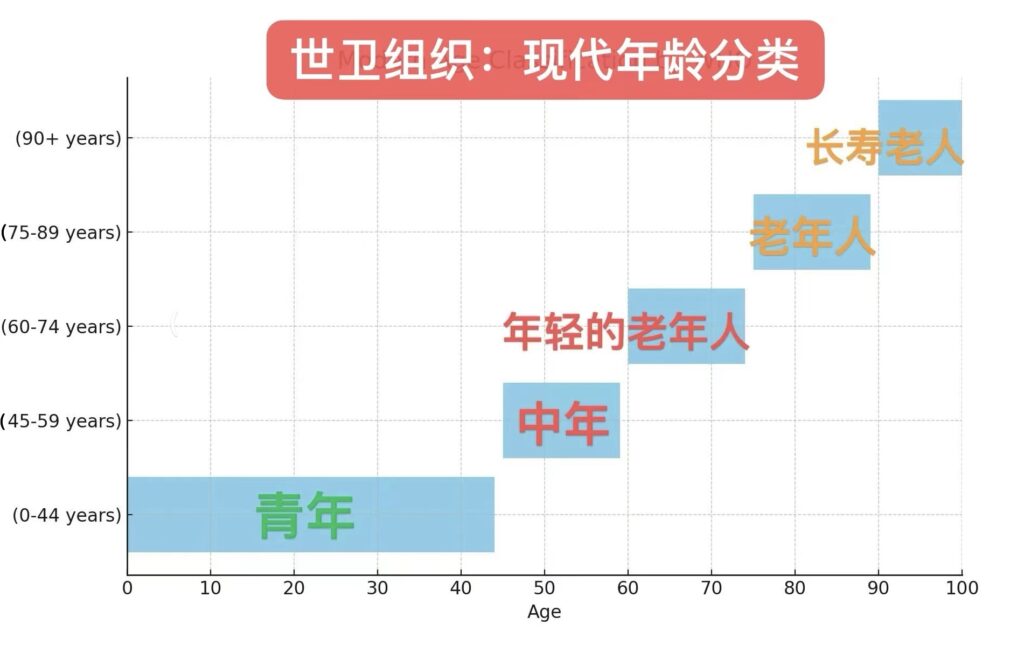据说世界卫生组织根据现代人生命状况,提出了人生阶段年龄的新划分,我觉得挺有道理,因为我认为他们的依据里有信仰的成分,先看图:

对现今50~70年代的人来讲,走过人生的半程,积累了丰富的阅历、经验和智慧,估计很多人对自己是不是老年人心生纠结,今天我们就探讨一下,顺便也思考一个更重要的话题:我们是否依然被过去的习惯、性格和生活方式所束缚?在这个关键的阶段,是否有必要进行一次彻底的自我更新?
老鹰的蜕变与老我的更新
传说中,老鹰在生命的中期会经历一场痛苦的蜕变(大约相当于鹰的中年吧)。当老鹰的羽毛老化,喙(huì)和爪子逐渐失去锋利时,它们会选择一个隐秘的地方,忍受极大的痛苦,用自己的喙和爪子拔掉老旧的羽毛,直到新羽毛重新长出,整个过程历时近半年的时间。这一过程非常艰难,也充满了危险,但它可以让老鹰重获新生,焕发出青春的生命力,值得他们为此一搏。
虽然是个传说且蛮有吸引力,但我个人认为,能做到这一点的鹰也肯定只是少数。但即便是少数,其意义却非常深远,它与基督教中的一个重要教义有着深刻的共鸣:“老我必须死去,才能有新生命。” 若要获得真正的重生,必须放下原有的自我,让灵魂得以更新。圣经中有一句话:“若有人在基督里,他就是新造的人,旧事已过,都变成新的了。”(哥林多后书 5:17)

‘老我’是什么?
在我们生活的前半段,也就是身为‘年轻人’的时候,凭借与父母、朋友、同事等交往的亲身经历,已经形成了一些相对固定的思维模式、行为习惯和性格特点。从某个角度看叫做‘成熟’,但步入‘中年’之后,这种成熟往往会在不知不觉中成为新一轮‘年轻人’眼里的老顽固。对基督门徒来讲,就是成了上帝眼中的‘老我’,这个‘老我’是相较于上帝的带领而言的,没有这样的信仰,你的经验便是世人眼中的‘老师傅’,会随着岁月的增加逐渐被淘汰。
我认为,意识到‘老我’的存在是个人生命转化的开始、智慧的开端。但即便是一个信主多年的肢体,或许依然会在行事为人的过程中严重的依赖所谓的个人经验或惯性思维,在当今物欲追求高度发达社会中,极少数的基督徒会通过祷告借助上帝的带领面对现实生活。脱离上帝带领的生活必然是撒但(撒但究竟是个什么‘鬼’?)的奴隶,担心焦虑等等情绪会时不时的搅扰自己的内心。换句话说,这些“老我”不仅包括我们对当前人和事的思考方式,还涉及我们对已经发生的事情的态度以及我们生活中的深层次反应。总之,面对任何人和事,都需要‘我、我、我......’这个人去做,当‘我’的头脑中全是过往的阅历经验时,这个‘我’就是‘老我’,是一个脱离了上帝带领的‘我’。让我从三个方面描述一下:
‘老我’的思维模式:过去的经历塑造了我们的思维方式,许多人因长期在特定的环境中生活,形成了固有的思维框架。我们可能习惯于从某种角度看待问题,或者总是抱持一种固定的态度面对挑战。然而,随着时代的变化,我们需要重新审视这些思维模式,是否阻碍了我们适应新时代的步伐。
‘老我’的对生活中已经发生的事情的态度:过去的挫折、失败、甚至成功,都在某种程度上影响了我们对生活的态度。我们可能对过去的一些事情耿耿于怀,或者难以放下心中的遗憾和怨恨,比如对来自原是家庭父母等亲人的影响,常常碍于亲情的缘故而忽略了他们自身‘老我’的错误给我们带来的恶劣影响或错误人生观。这些态度沉淀成了我们心灵的负担,阻碍了我们向前迈进。我们需要学会从不同的角度看待过去,放下对过去来自其他人(亲人)‘老我’的执着,重新获得内心的自由。
‘老我’的对未来的期待和心态:面对今后的人生,我们不仅需要重新审视过去,还需要以一个小孩子般的心态,像一粒种子一样在新时代的土壤中重新生长。耶稣曾教导:“凡要承受神国的,若不像小孩子,断不能进去。”(马可福音 10:15) 这种心态意味着我们要以开放、谦卑的态度迎接新事物,放下对自我和他人的成见,在上帝的带领下学会重新学习,共同面对生活的新挑战。
跨越痛苦,迎接新生
如同老鹰身体更新的过程一样,放下“老我”首先要做的是思想灵魂的更新。写这篇文章的目的不是劝他人去改变,因为每个人都有自己的生活节奏。改变并非易事,并不是每一个‘中年’人能够意识到并且愿意下决心改变自己,就个人经历而言,这些年的经历让我理解了那句话:道理都明白,但不都造就人,能改变一个人的只有‘南墙’。这堵墙是上帝特为衷心爱祂之人敲响警钟设立的,提醒我们在生活中的艰难时刻不要忘记对祂的仰望交托,而不是靠自己的老我思维模式。同时,它意味着我们需要面对内心深处的恐惧、伤痛和固有观念,而且你很清楚一个现实:再不承认自己的不足和错误做法就形同活在地狱中;渐渐的,你发现没有你的哪个朋友、家人可以代替你做这样的决定,从思维地狱中步入天堂的唯一途径就是借助来自于上帝信仰的力量并坚定的走下去。我所知道的方法是这样的:
首先,在上帝面前谦卑自己,检点一下哪些是自己持有的‘骄傲自满’?进一步去认识我们需要祂的引导和帮助。通过祷告、阅读圣经和参与信仰团体,我们可以获得精神上的支持和指引。在这个过程中,上帝会帮助我们看到自己生活中需要改变的地方,并赐予我们力量去实行这些改变。
其次,学会放下过去的重担,宽恕他人,也宽恕自己。放下论断是宽恕自己和他人的开始,也是真正放下心中的苦涩,迎接新的生命的开始。耶稣教导我们:“你们不要论断人,免得你们被论断。”(马太福音 7:1)论断也同样来自于自己的骄傲,中年人也应主动拥抱新的生活方式和思想观念,勇敢地尝试新的事物,接纳不同的观点,让自己的生活充满积极的变化。
第三,也是至关重要的,仍然是悔改!说实话,中年人这个岁数,在单位里是‘老大哥’、‘老大姐’或‘老领导’,在家里是长辈,按理说无论是从礼貌上还是从辈分上,没人敢轻易跑到你面前提意见,这时候唯有自我省察才有机会更新自己。
回想摩西带领在埃及为奴的以色列人进入迦南美地所经历的四十多年艰苦时光,那段时间不仅仅需要人们脚踏实地的走旷野之路,更需要全身心跟随耶和华。那些‘身在旷野,心在埃及’之人的结局是‘倒毙’在旷野,根本没有资格跨过约旦河。
现今50~70年代的人可否想过,假如你不愿意承认这一点,不愿意在上帝面前悔改的结果是什么呢?虽然你比父辈穿的好、开上了轿车、甚至会刷抖音打发时间......,但你依然在重复你父母的罪,依旧是生活在这思想的旷野中,原地兜兜转转。
再说一遍:唯一的出路便是在上帝面前悔改。撇弃‘老我’很难,就像鹰拔出自己的老旧羽毛那样,虽然非常痛苦但必然会受到耶和华的奖赏;否则你没有机会给同在旷野中挣扎的子女做出榜样找到人生的出路、进入上帝为其儿女预备的‘迦南美地’。
实现‘中年人‘的重生不是身体素质的更新,而是思想层面的灵魂交托,有了对上帝的敬畏和依靠,就是‘年轻的老年人’的铺垫。否则,无论在身体方面还是意识层面,你会渐渐成为一个被时代抛弃的老年人,你的儿女也会在将来的某一天步你的后尘~~~同样被淘汰,恶性循环。

灵魂的重生与家庭的更新
当身处中年的父、母能够经历这样的灵魂重生时,不仅自己的生活将焕发出新的光彩,家庭也会因此受益。孩子们将看到一个全新的父、母形象,充满爱、宽容和智慧;夫妻之间的关系也会因彼此的更新而更加亲密和谐。
中年是人生中一个关键的转折点,是我们重新审视自己、更新自己的最佳时机。就像那些勇敢的老鹰经历痛苦的蜕变获得新生一样,一代一代的‘中年人’也可以通过放下“老我”,让灵魂焕发新的生命力。现在的年轻人必定是将来的中年人,愿每一代年轻人、中年人迎接这一神圣的重生,成为神所喜悦的新造之人,愿神的恩典与平安与每一代人同在。

请弟兄姐妹们一起为此祷告!
(如有建议敬请留言讨论,邮箱:[email protected])
参考阅读:成为自由人的时间所剩无几:新时代使徒约翰的使命(EN ver. inside)
The Power of Rebirth: From an Eagle’s Transformation to the Renewal of the Soul
It is said that the World Health Organization—based on modern life conditions—has proposed a new categorization of life stages by age. I find this quite reasonable, as I believe that part of their criteria includes an element of faith. (See accompanying illustration.)
For many people born between the 1950s and 1970s, having traveled halfway through life and accumulated rich experiences, wisdom, and insights, there may be a lingering question: Are you already an old person? Today, let us explore this topic and also consider a more important issue: Are we still bound by our past habits, character, and lifestyles? At this critical stage, is it necessary to undergo a thorough renewal of ourselves?
The Eagle’s Transformation and the Renewal of the Old Self
According to legend, in midlife an eagle undergoes a painful transformation (roughly analogous to an eagle’s middle age). When its feathers grow old, and its beak and talons lose their sharpness, the eagle withdraws to a secluded place. There, amid great suffering, it uses its beak and talons to pull out the old feathers until new ones grow in—a process that lasts for nearly half a year. Although extremely arduous and fraught with danger, this process enables the eagle to be reborn and regain a youthful vitality—a transformation worth the struggle.
Even if this is only a legend—and indeed only a few eagles may achieve it—the significance is profound. It resonates deeply with an important Christian doctrine: “The old self must perish so that new life may emerge.” In order to obtain true rebirth, one must let go of the old self and allow the soul to be renewed. As the Bible says,
“Therefore, if anyone is in Christ, the new creation has come: The old has gone, the new is here!” (2 Corinthians 5:17)
What Is “the Old Self”?
During the first half of our lives—as “young people”—our interactions with parents, friends, and colleagues shape relatively fixed ways of thinking, behavioral habits, and character traits. In some sense, this can be called “maturity.” Yet, upon entering middle age, such maturity can, without our noticing, become what younger generations call being stuck in the ways of the “old head.” For a disciple of Christ, this becomes the “old self” in God’s sight. Without proper faith, your accumulated experience might simply render you a “veteran” in the eyes of the world—a status that, as time passes, will eventually be cast aside.

I believe that recognizing the existence of the “old self” marks the beginning of personal transformation and the onset of true wisdom. Even a longtime believer may fall into the trap of relying heavily on personal experience or fixed ways of thinking. In today’s society— where material desires are vastly cultivated—very few Christians will, through prayer and God’s leading, face the realities of life as He directs. A life that has drifted away from God’s guidance inevitably becomes a slave to Satan (see our discussion, “What Exactly Is Satan?”), with worries and anxieties that continually disturb the heart. In other words, the “old self” encompasses not only our habitual ways of thinking about people and events but also our attitudes toward what has already happened and our deep-seated reactions to life’s circumstances. When every decision is centered on “me, me, me…,” and our mind is cluttered with past experiences, that “me” becomes the “old self”—a self detached from God’s guidance.
Allow me to describe three dimensions of the “old self”:
- Our Fixed Ways of Thinking:
Past experiences shape our thinking. Many of us, having lived in certain environments for long periods, form fixed mental frameworks. We might habitually view issues from one perspective or always maintain a set attitude toward challenges. Yet as times change, we need to reexamine these patterns and ask whether they hinder our adaptation to a new era.
- Our Attitude Toward Past Events:
Past setbacks, failures, and even successes can, to a large extent, affect our attitude toward life. We might cling to past grievances or find it difficult to let go of regrets and resentments—perhaps influenced by our parents or other loved ones. Such attitudes become burdens on our hearts and hinder us from moving forward. We need to learn to view the past from different angles, releasing any unhealthy attachments to how others (even our own family) once behaved, so that we can regain inner freedom.
- Our Expectations for the Future:
Facing the future, we must not only reexamine the past but also adopt a childlike mindset—a seed ready to be planted in the soil of a new era. Jesus taught, “Truly I tell you, anyone who will not receive the kingdom of God like a little child will never enter it.” (Mark 10:15) This attitude calls for openness and humility in embracing new things, setting aside preconceptions about ourselves and others, and relearning how to confront life’s challenges under God’s guidance.
Crossing Over the Pain to Embrace New Life
Just as an eagle renews its body by shedding its old feathers, the first step toward relinquishing the “old self” is the renewal of our mind and spirit. The purpose of this article is not to compel change in others; each person has their own pace of life. Change is difficult—not everyone in middle age can realize or decide to transform their lives. In my own experience, I have come to understand the saying: “All the truth in the world does not necessarily equip a person; the only change comes from that wall you must face.” That wall is set up by the Lord for those who truly love Him—a reminder, in times of hardship, not to rely on our old ways but to trust in Him. It means confronting the deep fears, pains, and ingrained beliefs within us. You know all too well that if you fail to acknowledge your inadequacies and mistakes, you will remain in a kind of living hell; gradually, you’ll realize that no friend or family member can make these decisions for you. The only path from this mental prison to heaven is to rely on the power of faith and steadfastly continue along that road.
Here is what I have found to be effective:
- First: Humble yourself before God and examine what you carry as “pride and self-satisfaction.” Recognize that you need His guidance and help. Through prayer, reading Scripture, and being part of a community of believers, we receive spiritual support and direction. In this process, God helps us see where our lives need to change and gives us the strength to carry out those changes.
- Second: Learn to let go of past burdens—grant forgiveness to others and yourself. Releasing judgment is the beginning of forgiving both ourselves and others, and the true start of letting go of bitterness to welcome new life. Jesus taught, “Do not judge, so that you will not be judged.” (Matthew 7:1) Judgment too stems from our pride. Middle-aged individuals should willingly embrace a new lifestyle and fresh mindset, boldly try new things, and accept different viewpoints, allowing positive change to flow into their lives.
- Third: And most importantly, repent! Truth be told, at this stage—when you are considered an “elder brother,” “elder sister,” or senior leader at work and in the family—no one is likely to challenge your opinions out of respect for your rank. Thus, self-examination becomes the only chance to renew oneself.
Recall the Israelites who, led by Moses, endured more than forty years in the wilderness on their way to the Promised Land. That time required not only steady, concrete steps through the desert but also wholehearted following of the LORD. Those who remained “in the wilderness, with hearts still in Egypt” ended up perishing there— unworthy of crossing the Jordan.
So, for those of us born in the 1950s to 1970s: Have you ever considered what it will mean if you refuse to acknowledge this? If you refuse to repent before God, what will be the result? Even if you appear better off—wearing finer clothes, driving a limousine, and even spending time on trending apps—you may still be repeating your parents’ mistakes, living in a mental wilderness, trapped in a never-ending cycle.
Once more, the only way out is to repent before God. To shed the “old self” is as painful as an eagle ripping out its old feathers—and though it is excruciating, you will receive the reward from the LORD. Without such a change, you will never have the chance to serve as an example to your struggling children, to show them the way out toward the Promised Land that God has prepared for His offspring.
For middle-aged rebirth is not merely a physical renewal—it is the surrender of the mind and spirit. With reverence for and reliance on the LORD, you lay the foundation for a “young at heart” later life. Otherwise, both physically and mentally, you risk becoming an old person discarded by time. And one day, your children may follow in your footsteps—repeating the cycle and, ultimately, being eliminated in this vicious cycle.
The Renewal of the Soul and the Renewal of the Family
When middle-aged parents experience such a spiritual rebirth, not only will their own lives be transformed, but their families will also benefit. Children will see in their parents a renewed image—one filled with love, tolerance, and wisdom. The marital relationship, in turn, will grow more intimate and harmonious through mutual renewal.
Middle age is a critical turning point in life—a prime opportunity to reexamine and renew oneself. Just as a brave eagle, despite the pain of shedding its old feathers, emerges reborn, so too can each generation of middle-aged people cast off the “old self” and allow their souls to be infused with new vitality. Today’s young people will inevitably become tomorrow’s middle-aged. May every generation—young and middle-aged alike—welcome this sacred rebirth, become the new creation that pleases God, and may the grace and peace of the Lord be with every generation.
Please, dear brothers and sisters, join me in prayer for this transformation!

发表回复